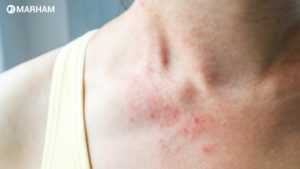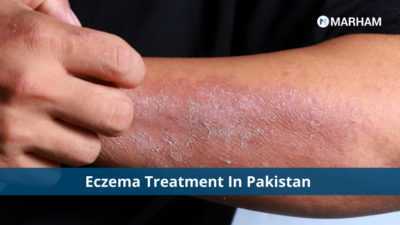Living with any skin condition that is unpleasant to seem and painful to feel is not an easy way. Millions of people all over the world have several skin diseases. Most of them are curable, but many conditions are manageable to some extent. Eczema is one of them. If you are looking for eczema treatment in Pakistan, this article will help you!
Firstly, you should have a brief idea about eczema, whether your skin condition is eczema or something else.
What Is Eczema?
Eczema is a skin condition that causes inflamed, itchy, cracked, and rough patches of skin. Some types can also cause blisters. The most common form of eczema is known as atopic dermatitis. The term “atopic” refers to an allergy. People with eczema often have allergies or asthma, along with itchy, red skin.
Eczema of various types and stages affects 31.6 million people in the United States, accounting for more than 10%. Some people grow out of condition, while others will have it for the rest of their lives. Asthma or hay fever may also accompany it. There is no cure for atopic dermatitis.
What Is The Cause Of Eczema?
Eczema (atopic dermatitis) results from a combination of immune system activation, genetics, environmental triggers, and stress. Your body’s immune system. If you have eczema, your immune system show reaction to minor irritants or allergens. Your skin may become inflamed as a result of this overreaction.
Children are more likely to develop eczema or another atopic condition if their parents have it or another atopic disease. The risk is increased if both parents have an atopic condition.
What Are The Symptoms Of Eczema?
- Skin becomes parched.
- Itching can be excruciating, especially at night.
- Hands, feet, ankles, wrists, neck, upper chest, eyelids, inside the bend of the elbows and knees, and, in infants, the face and scalp, have red to brownish-grey patches.
- When scratched, small, raised bumps may leak fluid and crust over.
Eczema Treatment In Pakistan:
Different treatment and management options for eczema are present, and they are available according to the patient’s condition.
There is no complete cure for eczema at the moment. The goal of treatment for the condition is to heal the affected skin and prevent recurrences of symptoms. A dermatologist will recommend a treatment plan based on an individual’s age, symptoms, and current state of health.
Eczema clears up with time for some people. On the other hand, others suffer from it for the rest of their lives.

Topical Corticosteroid Creams And Ointments:
These are anti-inflammatory medications that should alleviate the primary symptoms of eczema, such as inflammation and itching. They can be applied directly to the skin, and Prescription-strength drugs may benefit some people.
Oral Medication:
If topical treatments do not work, a doctor may prescribe oral medications like systemic corticosteroids or immunosuppressants. These are available as injections or as tablets to take orally, and they should only be used for short periods. It is also important to note that if the person is not taking another medication for the condition, the symptoms may worsen when the drugs are stopped.
Phototherapy:
Phototherapy entails being exposed to UVA or UVB waves. This method can be used to treat mild dermatitis. A doctor will keep a close eye on the skin throughout the treatment.
In severe cases, doctors may prescribe a particular class of drugs that control the immune system reactions that are thought to cause eczema. These “immunomodulators” are highly potent and are reserved for men and women who have failed all other treatments.
Laser Therapy:
Laser therapy has been widely studied in the literature and has reduced the itchy sensations caused by the eczema condition. Laser therapy has also been shown to help with skin eruptions while posing no risks of side effects.
Can We Prevent Eczema Flare-ups?
It is significant for people who are prone to eczema to avoid flare-ups. Individuals should moisturize their skin regularly, avoid drastic changes in temperature or humidity, avoid sweating, avoid wearing scratchy fabrics, avoid harsh detergents and soaps, avoid allergic triggers such as pollen and moulds, and reduce stress to prevent the condition from occurring.
Living With Eczema:
Eczema can have an impact on your emotional, social, and personal well-being. It can disrupt family life, personal and social relationships, leisure, holidays, and a variety of other day-to-day activities. The physical severity of your eczema does not always determine how much of your life is affected.
Consult Dr. Umer Mushtaq- Dermatologist:

Dr. Umer Mushtaq is a verified dermatologist from Lahore with a 96% patient satisfaction rate and over 15 years of experience. You can consult with Dr. Umer Mushtaq for just 1800/- PKR via Marham and get the best treatment.
Can’t Find The App?
| Android | IOS |
|---|---|
 |
 |
FAQs
-
-
What Is Eczema?
Eczema is a skin problem that causes inflamed, itchy, cracked, and rough patches of skin.
-
What is the cause of eczema?
Eczema (atopic dermatitis) results from a combination of immune system activation, genetics, environmental triggers, and stress.
-
Is Laser treatment available for eczema?
Yes, Laser treatment is available to treat eczema.
-

